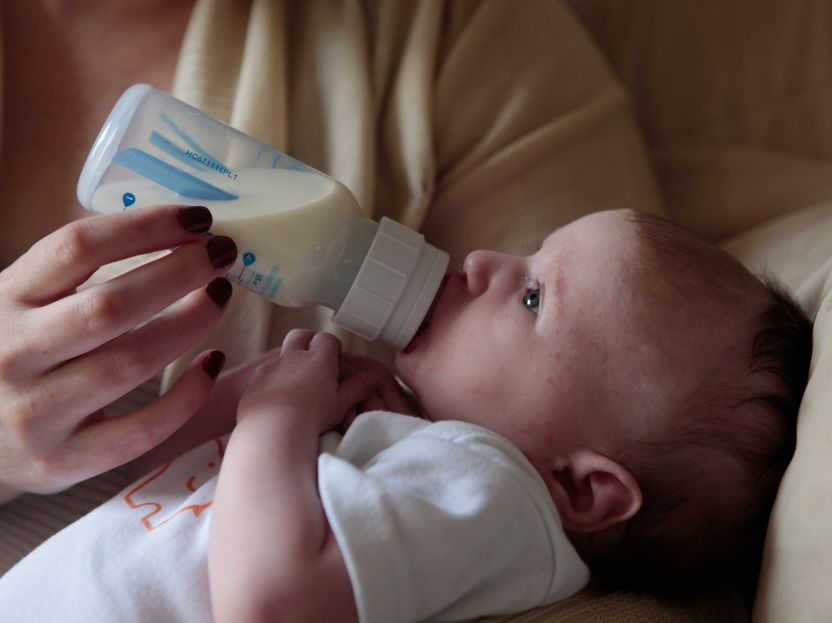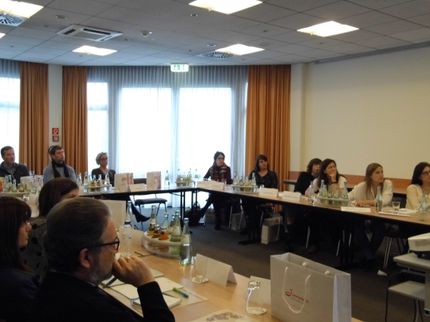Claims on infant formula products hardly scientifically proven
Most health and nutrition claims on food products for infants, i.e. substitutes for breast milk, are hardly or not at all supported by high-quality scientific evidence. This is the conclusion of an international study from 15 countries in which scientists from Leipzig University Medical Center participated. The data have recently been published in the renowned journal "The BMJ".

Lucy Wolski / Unsplash
Health and nutrition claims on food products for infants are controversial because they emphasize the supposed advantages over breastfeeding. However, there are few data on the frequency of the claims and their scientific support. That's why an international team of researchers:studied health claims on breastmilk substitute product packaging and accompanying websites in 15 countries on different continents from 2020 to 2022.
"Our findings reveal widespread but poorly scientifically supported health-related marketing claims on breast milk substitute products. Stronger regulation in addition to the World Health Organization's existing code for marketing such products, accompanied by consistent penalties for deviation from this code, appears necessary," said Jon Genuneit, co-author of the study and professor of pediatric epidemiology at the University of Leipzig. He and his team conduct research at the medical school on topics including breastfeeding behavior and breast milk.
Only 26 percent of breast milk substitutes with scientific reference to health claims
The current study included all health and nutrition claims that linked the product or one of its ingredients to a potentially beneficial effect on consumer growth, development or health. For 608 products, the most common claims were "helps/supports brain and/or eye and/or nervous system development" (53 percent), "strengthens/supports a healthy immune system" (39 percent) and "helps/supports growth and development" (37 percent).
Across all countries, only 161 of 608 breast milk substitutes included a scientific reference to support the claims. When scientific evidence was referenced, 14 percent of these were registered clinical studies, and 84 percent of these studies were conducted by author:s who were either funded by or directly affiliated with the food industry. For 74 percent of the products that made specific health claims, there was no scientific reference.
Little Separation of Ingredients and Health Effects
"At least one advertising claim was made for most infant formula products. Often, several ingredients were attributed with the same or similar health effects, and at the same time, individual ingredients were associated with multiple health effects. This lack of specificity could indicate that the links between ingredient and health effect are not causal or are named very superficially, allowing many false conclusions to be drawn by consumers," explains Prof. Genuneit.
The most common ingredient groups named in the claims of breast milk substitutes were unsaturated fatty acids, at 46 percent. Since February 2022, the unsaturated fatty acid docosahexaenoic acid (DHA), with proven, recognized health effects for the development of the child's nervous system, must be included in breast milk substitutes in the EU. As of February 2025, explicit advertising references to this ingredient will be banned in the EU. Other common ingredients include prebiotics, probiotics or synbiotics in 37 percent of infant formula and hydrolyzed protein in 20 percent.
A special feature of the study: it received no separate research funding, but was produced by an international medical network on its own initiative. The topic is topical; as recently as the beginning of February 2023, three articles appeared in the renowned medical journal "The Lancet" on the highly effective marketing apparatus of manufacturers of breast milk substitutes. In them, health experts called for a tougher crackdown on the marketing practices of companies and more support for mothers breastfeeding. In their scientific publication in THE BMJ, the researchers come to a common conclusion: "Our findings support the call for a revised regulatory framework for breast-milk substitutes to better protect consumers from the aggressive marketing of such products and health claims that are not understandable or valid to them."
Note: This article has been translated using a computer system without human intervention. LUMITOS offers these automatic translations to present a wider range of current news. Since this article has been translated with automatic translation, it is possible that it contains errors in vocabulary, syntax or grammar. The original article in German can be found here.




























































